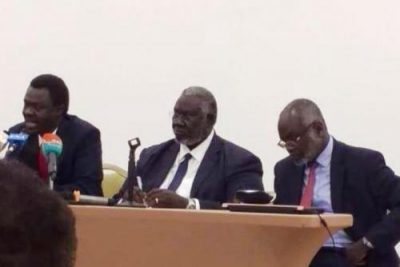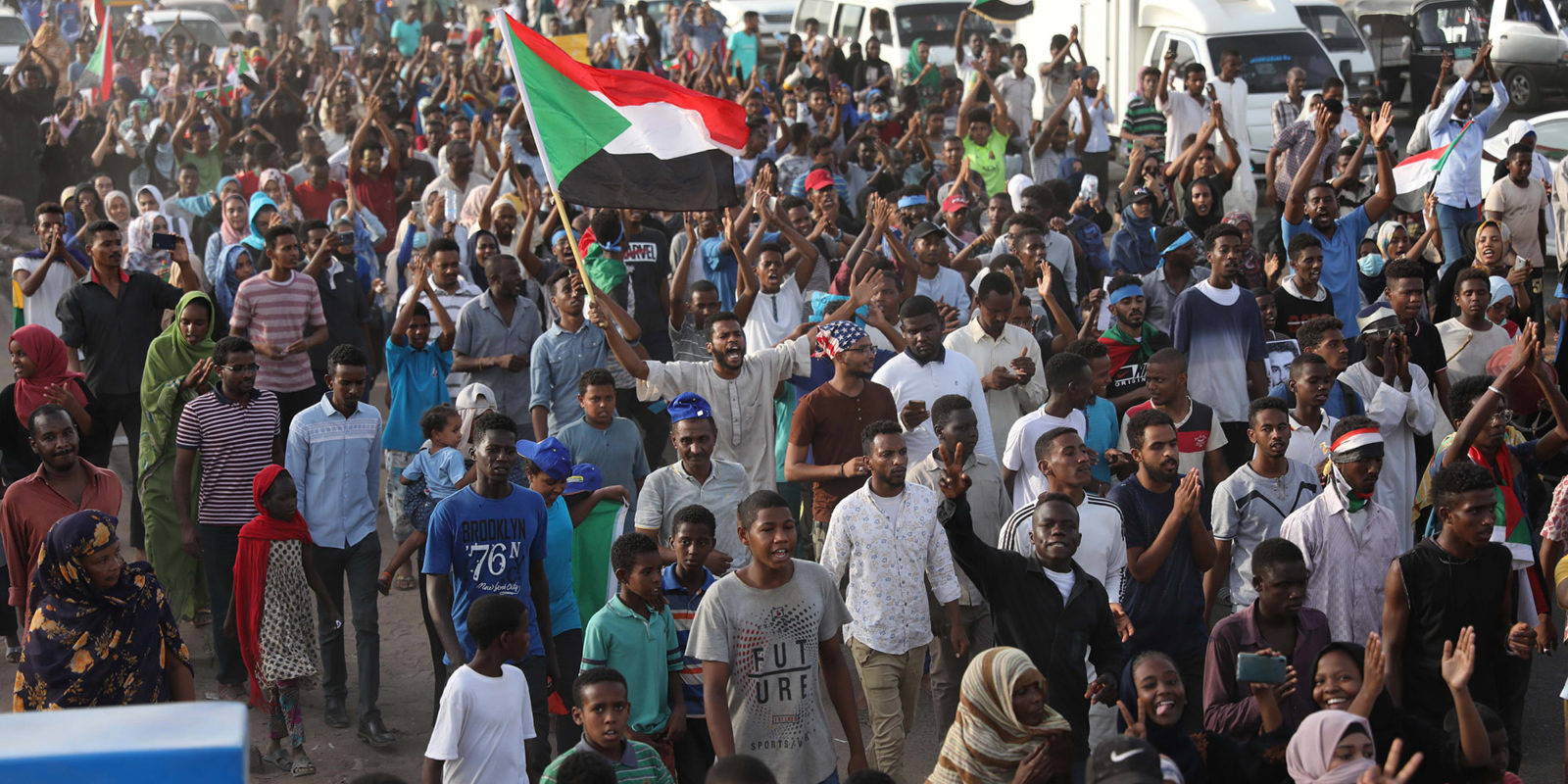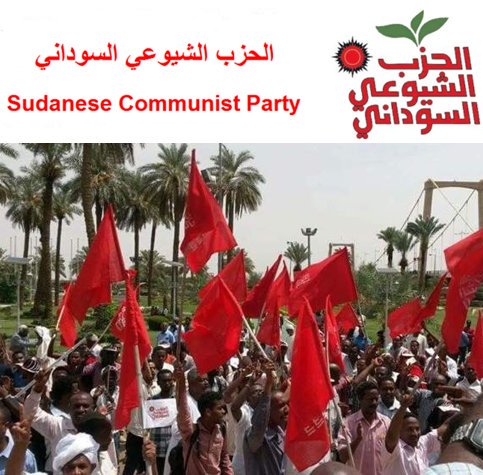Sudan’s Agreement on Political Declaration Leaves Many Unanswered Questions
Revolutionary Front and the Communist Party reject deal

An agreement on the Political Declaration signed by the Transitional Military Council (TMC) and the leadership of the Forces for Freedom and Change (FFC) on July 17 postpones firm decisions on key aspects of a comprehensive program which will determine the pace under which the Republic of Sudan can become a stable productive nation-state in Africa.
Discussions between the TMC and FFC have stalled on numerous occasions since the overthrow of former President Omar Hassan al-Bashir on April 11.
Various issues including the composition of a sovereign council and its role in the interim period remained one of the points of contention holding up the initialing of the pact. From the published text of the signed agreement, the TMC will chair the sovereign council for the first 21 months of its existence.
A civilian chair will then takeover for another 18 months prior to the holding of multi-party elections. Therefore, the transitional process will continue for more than three years.
Other aspects of the proposed structure of the interim authority are still not resolved. Further talks slated between the TMC and FFC are required to move the process towards the creation of a legislative body which can debate and decide upon domestic and foreign policy issues.
Altogether there are three structures which require unanimity among the TMC and FFC opposition coalition. The sovereign council is just one of the pillars of a much broader compositional arrangement.
The two others are legislative and government councils where no firm agreements on participation and make up have been reached. In addition, the political declaration calls for the formation of an investigative body to determine responsibility for the massacre of civilians on June 3 when thousands of demonstrators representing the FFC were forcefully removed from the center of Khartoum through the barrels of guns.
Sudan demonstrators celebrate signing of political declaration on July 17, 2019
FFC spokespersons have claimed that over 100 people were killed during the crackdown. The TMC has put forward conflicting figures saying the death toll was far less than what the FFC has stated.
In an article published by the Sudan Tribune on the signing of the document, the news agency says:
“The parties in the upcoming days will deal with the constitutional document which defines the attributions and powers of the three organs of the transitional authority. The FFC recently voiced its opposition to the absolute political immunity given to the TMC members in a draft text released by the joint mediation. Different proposals have been made to make it reversible in case of involvement in human rights violations, killing or other crimes.”
Whether this document can lead to a lasting peace inside the country of 41 million people still remains to be seen. Demonstrations erupted in December with the sharp rise in the cost of bread and other commodities.
Although Sudan is an emerging oil-rich state the partitioning of the country in 2011, once Africa’s largest geographically, has resulted in a decline in the national economy. The neighboring Republic of South Sudan is also in turmoil with the two leading factions of the ruling party unable to reach a workable solution to the dispute which resulted in a civil war beginning in December 2013.
Over the last five years the price of oil has fluctuated on the international market. In desperation the National Congress Party (NCP) administration headed by the ousted President al-Bashir solidified an alliance with the Saudi Arabian and United Arab Emirates monarchies leading to the participation of the Sudanese Armed Forces (SAF) in the United States engineered genocidal war against the people of Yemen.
An estimated 70,000 people have died in Yemen since March 2015. Pentagon weapons and military technology are utilized in the war aimed at suppressing the Ansurallah Movement and its allies in the least developed state in the Middle East. A humanitarian crisis including the widespread outbreak of cholera has been declared the worst of such disasters in the world.
Revolutionary Front and Communist Party Reject TMC-FFC Deal
Two political forces in Sudanese society have refused to endorse the July 17 agreement between the TMC and the FFC. The Sudanese Revolutionary Front (SRF) and the Sudanese Communist Party (SCP) both claim that the agreement is inadequate and does not resolve the fundamental problems facing the people of the country.
Sudanese Communist Party publication
The SRF is an alliance among the Sudanese People’s Liberation Movement/Army North (SPLM/A-N), based in South Kordofan and Blue Nile states while the Justice and Equality Movement (JEM) and two factions of the Sudan Liberation Movement/Army emanate from the western Darfur region. These groups are engaged in armed actions against the Sudanese military in the above-mentioned regions of the country.
Sudan Tribune in an article published July 17 reports on the position of the SRF in relationship to the TMC-FFC agreement noting:
“[S]pokesman Mohamed Zakaria Farajalla said on Wednesday that the Front was surprised by the initialization of the agreement between the two parties while it was engaged in consultations meetings with a delegation of their allies in the FFC in the Ethiopian capital on ways to achieve peace. He said that the agreement reached by the FFC political and armed groups in Addis Ababa provides to include the SRF vision in the political and constitutional agreements with the Military Council.”
This report goes on to reveal that the SRF will not be bound by the accord. SRF spokesperson considers the organization as part of the FFC and therefore betrayed by the political leadership in Khartoum.
This same Sudan Tribune article goes on to quote Mohamed Zakaria Farajalla who emphasized that:
“It is not understandable that the deliberations of Addis Ababa meeting are in their final stage and the FFC negotiating team inside the country concludes the agreement without waiting for the outcome of Addis meetings to be included in the agreement. This approach is flawed and unacceptable and will complicate the national process. As the Sudanese Revolutionary Front, we affirm that we are not a party to the agreement and we have the right to take what we see as appropriate steps to achieve peace and democratic transition.”
The Sudanese Communist Party (SCP) has also issued a statement based upon the deliberations of its Central Committee related to the contours of the July 17 agreement. The SCP is concerned about the current and future role of the military as well as Sudanese foreign policy specifically related to the war in Yemen and the continuing alliance with the Gulf Monarchies which are bankrolling the TMC regime to the tune of hundreds of millions of dollars.
Concluding its evaluation of the TMC-FFC deal, the SCP declared:
“[W]e reaffirm our rejection of this agreement and to uphold the forces of freedom and change and to continue the struggle and peaceful mass escalation in various forms until the goals of the revolution and the total conflict of civil and democratic governance are achieved.”
Prospects for Peace and Security
Another unsettling development in the Sudanese situation was the announcement on July 11 that an attempted military coup by personnel opposed to the then pending TMC-FFC settlement had been thwarted resulting in the arrest of 12 officers from the SAF and the National Intelligence and Security Services (NISS). TMC Security Committee Chair Gamal Omer Ibrahim announced to the press that five of the officers involved in the failed putsch were in retirement.
The apparent disgruntled elements within the military and intelligence services appear to be in a minority. However, these events contribute to the uncertainty of the political situation when viewed in conjunction with the current rejection of the July 17 agreement by the SRF and the SCP.
Consequently, the role of the African Union (AU) mediators in the persons of the Mauritanian diplomat Mohammad Alhassan Lebatt and his Ethiopian counterpart Mahmood Derair are essential in maintaining lines of communications among the various parties within the Sudanese political context. SRF groups want to solidify any sustainable agreement through the signing of a peace treaty with the Khartoum government.
Important observations made by the SCP must be taken into serious consideration by the TMC and FFC leadership. A lasting peace cannot be secured until the majority of the Sudanese people have a stake in the political and economic future of the country.
A lasting peace agreement in Sudan is important to the rest of the AU member-nations. Further conflict and unrest in this strategically important state will inevitably spill over into contiguous countries who themselves are facing similar challenging which impede the unity and development of the continent.
*
Note to readers: please click the share buttons below. Forward this article to your email lists. Crosspost on your blog site, internet forums. etc.
Abayomi Azikiwe is the editor of Pan-African News Wire. He is a frequent contributor to Global Research.
All images in this article are from the author



